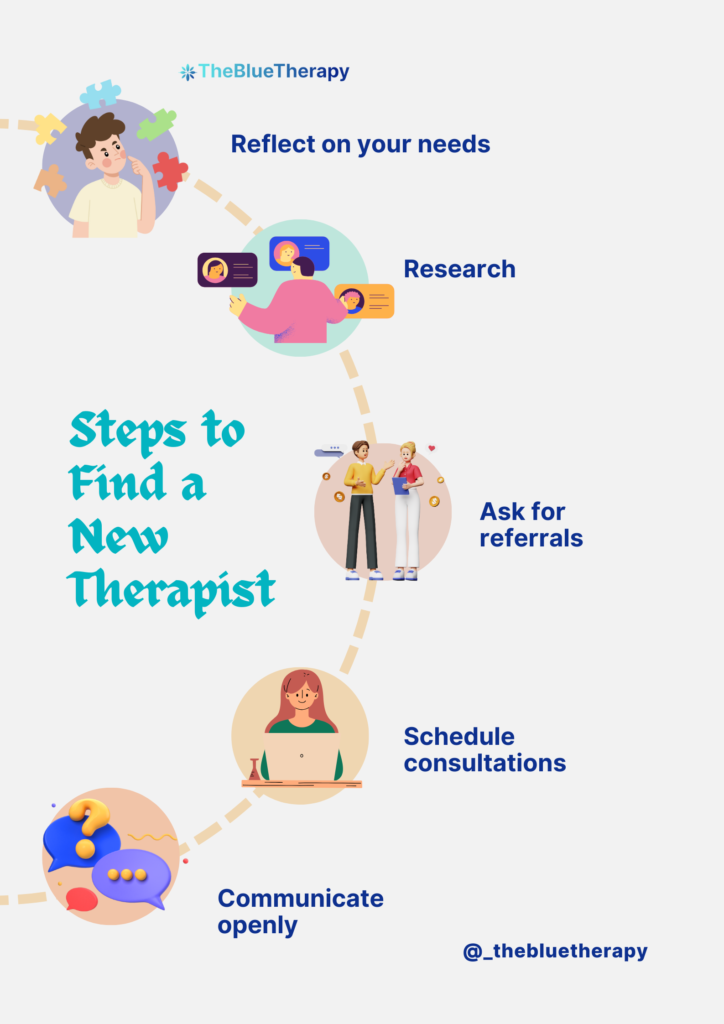Finding Your Perfect Match
Why Therapy Breakups are OKAY?
Seeking therapy is a courageous step towards better mental health. However, the journey doesn’t always follow a smooth path. Maybe after a few sessions, you feel something’s off. You may even find that therapy isn’t working as well as you hoped. You might feel discouraged or wonder if therapy itself isn’t for you. Here’s the truth: therapy isn’t a one-size-fits-all solution, and finding the right therapist is crucial for making progress.
Normalizing seeking a therapist that aligns well with your needs is crucial for ensuring you receive the best care.
Understanding Therapeutic Relationship
A therapeutic relationship is a critical component of successful therapy. Think of therapy as a journey you take with a guide. This therapeutic relationship is built on trust, understanding, and mutual respect. When all of these elements are in place, clients are more likely to feel comfortable in opening up, exploring difficult emotions and working towards their goals.
Signs Therapy Might Not Be Working
There are a few reasons why therapy might not be a perfect fit initially.
Lack of Progress
If you feel that you’re not making any progress despite being in therapy for a while. This could be a sign that something isn’t right. Progress is usually slow in therapy, but at times, you do notice some changes over time.
Therapist’s Approach
Therapists use different therapeutic approaches. If the therapist you’re working with uses methods that don’t resonate with you or feel ineffective, it might be worth considering a change. It’s okay to explore other options.
Lack of Connection
Sometimes, despite the best efforts, there’s no alignment or connection. The relationship feels empty and unrelated. You might also feel your therapist isn’t listening to you or validating your experiences. This can be hard to build a trusting relationship. A strong alliance is based on mutual respect, trust and understanding. And this may not happen with every therapist.
Constant Discomfort
While therapy can be uncomfortable at times, consistent feelings of discomfort, unease or dread about sessions might indicate a poor fit with your therapist. Discomfort can also show up in the form of communication.
It’s highly important to remember that therapy is a two-way street. You deserve to feel heard, understood, and supported. Don’t be afraid to have an open conversation with your therapist about your concerns.
Normalizing the Idea of Finding a New Therapist
Changing therapists is not a sign of weakness or failure. It’s a proactive step towards finding the right support for your mental health needs. Here are some reasons why seeking a new therapist should be normalized:
Therapy is Personal
To each person, therapy is a different set of experience. What may work for one individual may not work for another.
Therapists Practice Different Modalities
All therapists have varied training, specializations and approaches. Finding a therapist whose expertise aligns with your needs is crucial for effective treatment. Maybe, someone skilled in CBT isn’t fit for your needs and you would benefit from other approaches.
It’s Common and Acceptable
Switching therapists is normal and common. Many people go through several therapists before finding the right match. It’s a normal part of the therapy process and nothing to be guilty or ashamed of.
Compatibility Matters
Having a connection between you and your therapist is important for the success of therapy. Feeling heard, respected, understood and valued by your therapist fosters a safe environment for you to explore your innermost thoughts and feelings. Recognizing when the relationship isn’t working and taking active steps to understand what works for you demonstrates self-awareness.

Steps to Find a New Therapist
If you have ultimately decided that finding a new therapist is the best course of action for you, then finding the perfect match is absolutely possible! Here are some important tips:
Reflect on your needs
Consider your goals from therapy – what are you hoping to achieve? Do you have specific areas you want to focus on? What qualities are important in a therapist, according to you?
Research
Many therapists have online profiles outlining their areas of expertise, therapeutic approaches and sometimes even their communication style. Read their reviews, and also check for their credentials.
Trust your instincts
Even during the initial consultations (video/audio calls) trust your instincts. If something feels off or if you don’t feel a connection, it’s OKAY to keep looking.
Ask for referrals
Talk to your friends, maybe your family doctors, and other family members who can share contacts of some therapist options you can explore.
Schedule consultations
Many therapists offer free consultations. List down the names of the therapists you feel a good find and schedule consultations with them. Use this opportunity to get a feel of their personality, communication styles and their approach. And, don’t be afraid to ask questions!
Communicate openly
Once you do find your perfect match and you start your journey with them, remember to communicate openly and honestly about what worked and what didn’t work with your previous therapist(s). This can help your new therapist better understand what suits your needs.
Conclusion
Finding the right therapist can be a life-changing journey. It’s okay if it takes time and a few tries to get it right. Don’t get discouraged if the first few attempts aren’t perfect. Not every therapy session has a ‘breakthrough’ either. Therapy is a personal and dynamic process that requires a strong, trusting relationship between you and the therapist.
Remember, it’s not about finding any therapist – it’s about finding the right fit for you!
The Blue Therapy offers counselling services to anyone who need it. Take the step towards getting help and reach out to us today!


